Finding My Way with Poetry and Trumpeter Swans in a Week of War and Anxiety, A Change in Perspective
- At March 06, 2022
- By Jeannine Gailey
- In Blog
 0
0
In a Week of War and Anxiety, Finding My Way with Poetry and Trumpeter Swans
It’s been another week of war stress, watching the Russians march into and bomb Ukraine and its people and besides that, five people a day in my county, which is highly vaccinated, are still dying of covid but all the restrictions are being lifted anyway, so that’s fun. War with Russia trying to take over the world supervillain style and a pandemic? Why are we having a hundred years of history but only the bad parts in two years?
Not only that, everyone, including me, seems more stressed and anxious than usual. I have to remember to be kinder than usual, and my social skills have not improved from being basically isolated in my house for two years. Also, on the road trip, I saw at least three cars driving to try to kill each other. People, the highways are not your anger management strategy.
 So I was pretty tense and once again, sleepless for most of the week. I tried meditation, deep breathing, exercise, and yes, prayer. I wrote to my senators. I gave to multiple charities trying to help Ukraine. But mostly I felt helpless and kept having war dreams. I dressed up and put on makeup and decided to spend some time outside. (PS This is one of my possible author photo outfits, still deciding, speaking of things that aren’t important…)
So I was pretty tense and once again, sleepless for most of the week. I tried meditation, deep breathing, exercise, and yes, prayer. I wrote to my senators. I gave to multiple charities trying to help Ukraine. But mostly I felt helpless and kept having war dreams. I dressed up and put on makeup and decided to spend some time outside. (PS This is one of my possible author photo outfits, still deciding, speaking of things that aren’t important…)
By the way, you should read this piece on CNN by my friend and poet colleague Ilya Kaminsky about his home country and the place that poetry and humor have in Ukrainian culture. And if you haven’t read Ilya’s poetry, his first book, Dancing in Odessa, or his second, Deaf Republic, are excellent – and educational – reads.
Poetry Cannot Save Us, But…
As Ilya’s piece shows, poetry can stay important even in a time as fraught as ours. I’m currently reading Dana Levin’s upcoming book from Copper Canyon, Now Do You Know Where You Are, for a review and her work is apocalyptic in its own way and it delves into her move to St. Louis, where my father grew up. Of course, with the title, I immediately staged a photo picturing Sylvia the kitten going on a road trip with the book as reading material. Ah, some of us have different ways of dealing with stress!
In a way, reading her work was able to transport me and made me think about what poetry is and isn’t able to do. I’ve been writing poems about nuclear war, about the Doomsday clock, about being in a pandemic as a disabled person. Are these poems that will help other people? I can’t tell. But I can say they are what I need to write right now.
What are you reading right now?
Spending Time in Nature with Eagles, Swans, and Daffodils
Today it got up to fifty degrees, no rain, and sunset was as late as 6 PM, so we decided to take a short day trip to spend some time in nature. We went up to a famous spot for bird watching, Skagit Valley, Washington, which gets snow geese, Trumpeter swans, tundra swans, who migrate, and eagles and herons year-round.
We saw so many Trumpeter swans, a pair of bald eagles, and a few early blooms – daffodils and a crocus – at Roozengaarde Gardens, which was completely empty of visitors except for us. Getting out of the house and out of my own head helped my thinking, my mood, and my outlook. Sure, looking at eagles and swans can’t fix the world’s problems – but they do remind us of the good and beauty in life.
- Pair of bald eagles
- Purple Crocus
- Trumpeter Swans with mountains
A Change in Perspective
One of the good things about both reading and getting into nature is that they both provide a welcome change in perspective. They remind you of the larger world and your place in it. Sometimes we have both an inflated sense of our place in the world AND an inflated sense of our ability to control it. On a micro level, we can do positive things – we can plant a tree, or give money to a charity that helps people who suffer in a war across the world, or write a letter about an issue we care about. On a macro level, we are each part of a much larger system – in which we don’t matter all that much, which is both a sobering and a comforting reminder. In the face of evil, we can ignore it or we can resist it. We can be grateful for the instances of beauty all around us. In a time that seems very apocalyptic, we can choose to hope.
Leaving you with a few more shots of swans…
- Trumpeter Swans in a field
- closeup of Trumpeter swan
A Week of Insomnia, the Threat of Nuclear War and Ukraine Heartbreak, Spring Approaches but with Record Cold and Snow (plus bobkitten!)
- At February 27, 2022
- By Jeannine Gailey
- In Blog
 1
1
A Week of Insomnia and the Threat of Nuclear War
How are you doing? If the stress of the pandemic was not enough, now we are dealing with the threat of WWIII this week as Putin invades Ukraine. The ghost of nuclear war anxiety – something I was familiar with as a kid in the eighties, where nuclear war with the then-Soviet Union was always on our minds and felt like something that could happen any day – is back. My childhood home, Oak Ridge, Tennessee was always on the bombing risk list because although it is called “the Secret City,” the secret is pretty much out that it’s a place that the US could – and definitely has in the past – manufacture nuclear weapons.
So all week I have been unable to sleep, perhaps not inexplicably. I’ve also been running a fever all week, tired, stressed. As mask mandates and vaccine requirements are lifted, the high-risk (like me) are left more vulnerable.
But as the thought of pandemic stress is starting to wane in most American’s minds, it’s still there for me, and now on top of that, heartbreaking videos of young women preparing to defend their country – teenage girls standing in front of their homes unarmed facing armed Russian soldiers, elderly Ukrainian women offering sunflower seeds to the Russians to help commemorate their dead, a 26-year-old teacher being drafted to defend her home city of Kyiv, the bombings, the black smoke, the air raid sirens – anyone with any amount of empathy must be overwhelmed, and when faced with the inaction of the US and Europe against this dictator’s Hitler-like takeover of a country, equally angry and feeling powerless. My brother, who worked extensively in Ukraine in his last job in tech, encouraged me to write to my senators and to send money to Ukrainian charities. If I could become a superhero right this second, I would go and defend the brave citizens of Ukraine.
Spring Approaching and Nuclear Poems
This week was so strange – cold, sunny days, record-breaking below freezing temperatures at night, even snow – and spring flowers. It made me think of the news, the frenetic dives between politics and plague.
In the beginning of the pandemic, I dreamt repeatedly of nuclear war, and wrote this poem in response, which suddenly seems alarmingly prescient. I usually don’t post unpublished poems, but this one seemed timely. It may make its way into my newest book.
Just a Little Bit of History Repeating
Those of you who are students of history could not be unaware of the parallels to WWI and WWII right now – the financial instability, the crazed dictator and his alliance with an equally sketchy country or two, the global pandemic and war stresses at the very same time, and the stubborn slowness of the US government’s response to both pandemic and war. You know Woodrow Wilson never even publicly addressed the 1918 flu, despite the deaths of one out of every ten Americans from it and he actively increased infection by shipping infected young soldiers around in too-close quarters? Did you know most Americans didn’t want to help Europe in WWII, despite so much evidence that Hitler was a monster and committing heinous crimes – and that we refused refugees’ applications to enter the US, especially of Jewish people, even Anne Frank? (True fact!)
And despite all of this alarming information, the birds are singing louder, the flowers are starting to show their willingness to bloom despite temperamental weather. I feel like I should be tougher, more resilient, like the flowers. My body betrays me – lying awake, uneasy dreams when I do finally get an hour or two of sleep – the fevers, dark circles, nails splitting and a nagging cough. My body knows things are really not okay, no matter what meditation apps I use, or deep breathing exercises I try, or cures of tea, soup, and vitamins.
In the unease of the end of February, let’s hope for a better spring – easing up of pandemic death rates, an end to Putin’s ambitious power grabs (and China’s eyeing of Taiwan in the background) that put the entire globe out of balance – a time when we can once again see our friends and family, that America defends its allies and welcomes refugees from despots. The hope that my doctors can help sort out the haywire immune system problems that keep me from living the life I want. If I can banish the discouragement brought on by plague, and war threats, the political strife in America – maybe I can write more poems. Even if the poems can’t bring peace and health to the planet, or even bring an end to my insomnia.
PS: Last night there was a bobkitten sighting on my Ring recorder – a small bobcat, and he was wagging his tiny little bobbed tail! That seems like a good sign!
The Future of Lit Mags, Birds and Blooms in February
- At February 20, 2022
- By Jeannine Gailey
- In Blog
 0
0
The Future of Literary Magazines
CNN did an article this week, surprisingly, on the future of literary magazines, particularly smaller mags: Long-standing literary magazines are struggling to stay afloat. Where do they go from here? – CNN Style. They talk about the lit mags going under – even big ones, like The Believer.
In the fifties and sixties, the CIA, among other government agencies, sunk a surprising amount of money into literary magazines like The Paris Review, The Kenyon Review, and many others, in order to fight the cold war, so the speak, in the art world.
For a while, universities seemed willing to foot the bill for literary magazines for the prestige, but now, they’re shutting down MFA programs and their accompanying literary magazines left and right, as unbusiness-y, unprofitable.
So what is the future of lit mags? I joked that maybe it’s in the hands of some of the richest people in the country – the ex-wives of Bill Gates and Jeff Bezos, aka Melinda and MacKenzie. I met MacKenzie once at a writer’s conference, not knowing who she was, assuming she was just another struggling writer. I think she might be open to a solicitation for the right kind of magazine – she’s giving away her fortune at astounding rates, which: good for her. Their husbands were never going to do much for the arts out here, even though they live here in Seattle (and the Eastside). You’d think they’d do more for local culture! But their ex-wives will be big contenders in shaping where Seattle’s non-profit scene is at, and not just that, but the whole country’s non-profit scene.
When I volunteered for several lit mags, I begged them to try to raise subscription numbers, to take adds from local businesses, to hold more creative fundraisers, anything so they weren’t so attached to either a) a university’s funding or b) a single angel investor. How can a literary magazine make a profit, and do we even want to worry about that? My answer is, if you want to keep them around, then yes. Often, lit mags are very expensive compared even to the fanciest “regular” magazines. Younger readers expect to get their content for free – even regular mags are struggling with subscriptions. So we have to give readers a reason to buy the magazine. What would that be? What do you think? Are lit mags doomed? Can someone start throwing awesome parties that might attract billionaires looking to share the wealth with the literary arts? And invite me?
Birds and Blooms in February
It’s about to freeze again tomorrow and stay below freezing for three days, so while I’m excited for these early blooms and birds, I’m nervous that the lone bumble bee I’ve seen at my garden might be doomed, much like literary magazines. Camellias and jonquils, mostly, but other things in my garden are budding up. Despite the coming freeze, spring is coming. It’s just taking it’s time this year, a little stop and start.
Our bird visitors this week included lots of Anna’s hummingbirds and a less common visitor – a red-winged blackbird. It was mostly rainy, as you can probably tell, which doesn’t make for the best pictures, but I thought you’d enjoy seeing them anyway. Also, my cat Sylvia with a Valentine’s Day ribbon, just to mix it up.
- Red-winged blackbird
- Anna’s hummingbird
- Anna’s hummingbird
- Red-winged blackbird
- Pink camellias in bloom
- Red-Winged Blackbird in Flight
- Valentine cat Sylvia
Happy (Almost) Valentine’s Day, Faux Spring, and Thinking About Changes in Seattle’s Lit Scene
- At February 13, 2022
- By Jeannine Gailey
- In Blog
 0
0
Happy (Almost) Valentine’s Day!
We had a beautiful sunny day today, and Valentine’s Day is supposed to be a rainout, so we tried to get out and about and soak in as much “faux spring” – that’s what our weather person called it – as we could. I heard a robin singing this morning, and downtown, I saw a forsythia blooming (though ours hasn’t quite done that yet).
With the Superbowl AND the Olympics, it seems to be a sports-crowded time to celebrate what’s traditionally a romantic weekend! That’s okay. I’m pretty sure we can have Glenn watch the Bengals (hopefully – they’re the team of my former hometown, Cincinnati) win, have me watch some figure skating (so much scandal this year!), and also find a way to carve out time for some romance.
We took a trip over to Seattle to Open Books to buy a few books before it moves from Wallingford to Pioneer Square -a big change after 20 plus years in the same location. It made me think about how much Seattle’s lit scene has changed since we moved here in late 2000.
I also goofed around with possible author photo outfits (did I mention I have author photos for BOA coming up and I’m terrified?) with Glenn taking the pictures with our “fancy” camera. What do you think? Do either of these tops work? I think this hair color is a bit too rose gold – I think I’ll skew it a bit pinker for the photos. Argh! How do regular poets do this? Pictures are hard!
- In pink, regular pose
- Pink top, funny pose, floofy fleeves
- Rose gold hair, rose gold top
Faux Spring in February
It’s already felt like a too-long, gloomy winter, and many of my friends have already traveled at least once to sunnier climes to relieve their winter blues. I can’t do that yet, so getting a little bit of 50-degree sunshine in February is a real gift. A few rhododendrons and forsythia blooms, and I can’t wait ’til the cherry trees start blooming.
The birds are definitely more active than they were a few weeks ago. This forsythia was blooming a door down from Open Books. Walking along Lake Washington in Kirkland is a nice break from cloudier, moodier Woodinville. We also picked up pink roses and tulips to brighten up the house so it felt a bit more romantic and spring-like.
- Anna’s Hummingbird in Pussy Willow
- Northern Flicker
- Forsythia
Thinking About Seattle’s Changing Literary Scene
Yes, our trip today to Open Books – the first place I visited as a tourist to Seattle on the recommendation of one of my English professors at University of Cincinnati – reminded me of how things have changed since we moved here. Pioneer Square – a rowdier, bar-filled tourist spot that once housed Elliot Bay Books – will be the new home of Open Books, which lived in sleepier, more residential Wallingford since before I came to the town as a visitor. Elliot Bay moved to hipster – but now more “corporate condo” than “hipster artists and bars” – Capitol Hill. I used to meet friends at Open Books – see pictures – and I’ve had almost every launch reading for my books there, too. See a picture of one of them below. I’ll have to make new memories at the new location.
I used to spend hours in the rundown former funeral home that housed the Richard Hugo House when I first moved to town, imaging I was in a real artist’s place – and then I volunteered there for small local lit mags for a while. Back then, yes, there were drug deals in front of the place, it wasn’t at all accessible, and there was a rumor of a baby ghost in the basement (along with a baby’s coffin) but it felt charmingly quirky, much like the area of Capitol Hill, where you could get a drink at a dive bar with pinball machines or papier mache unicorn heads. Now, Hugo House is housed in the fairly cold, corporate grounds of a re-done condo building (and paying much more than it used to on rent, which leads to more fund-raising and less, well, artist-nurturing), and it just doesn’t feel as cozy and welcoming and well, artistic. It is more accessible (bonus!) and has bathrooms you don’t accidentally get locked in…and no ghosts (yet…)
The places that I’ve relied on to meet other writers – like Open Books and Hugo House – are changing, and have changed, and while I’m sad about that, I recognize that a city doesn’t stay the same, and a literary scene doesn’t stay the same. During the pandemic, we haven’t visited Seattle much, and we used to go every weekend, to hang out, to visit Pike Place Market or one of the many bookstores and coffee shops, always exploring new (to us) neighborhoods. Seattle’s increasing homeless problem, litter, and crime are unfortunate side effects of growth and some serious housing affordability problems as well as a lack of resources for the poor, the mentally ill, and people who age out of the foster system. Our politicians have promised fixes but haven’t (as yet) delivered. Does this affect the art scene in Seattle? Yes. Did the pandemic hurt our art scene? Unquestionable. Do we have AWP coming out next year? Yes we do! Do I want to show Seattle in its best light to my friends who come to town? Yes I do! So I will keep exploring to find out where writers and artists are hanging out now. Maybe I’ll find the next new cool artistic hangouts. I hope so.
And another problem – I live in an “ex-urb” of Seattle, Woodinville, a sleepy area of farms and wineries and a surprising number of hidden charming corners, but it has almost nothing that you could call “culture.” No art galleries, barely any indie shops, we have one Barnes and Nobles and a couple of coffee shops besides Starbucks but it’s been hard for me to build a community out here – and I encountered similar problems in 2012 when I was Redmond’s Poet Laureate, working hard with schools and librarians and visual artists and local language clubs to try to generate interest in poetry and art. Even though Redmond has Microsoft and a fair number of millionaires, and Bellevue’s real estate is now more expensive than Manhattan (said our local paper this weekend,) it’s tough to attract people or the funds to create cultural centers where art, music, theater, and poetry might thrive. I’ve dreamed of throwing salons in the area, which is beautiful, and I’m sure has a lot of artists, musicians, and writers in it, it’s just…I can’t find them, or we have no gathering places.
If I had unlimited funds and time, I might build a poetry bookshop/coffee shop/art space myself here in Woodinville, where real estate isn’t quite as pricey. I lived in Napa for a year, and they had a wonderful mix of wineries, indie book shops and restaurants, and unique gardens, farms, and markets that just made for a lovely quality of life. (Fires, earthquakes, and high taxes – all endemic to California – notwithstanding.) They even had their own writer’s conference each year! We need to start something like that. I’ll keep dreaming…
Happy February, Inching Towards Spring, Hoping for a Better Month, A Nice Review on Instagram (and Thoughts on Instagram for Poets)
- At February 06, 2022
- By Jeannine Gailey
- In Blog
 0
0
Happy February! Inching Closer to Spring…
Welcome to February, everyone, which means not only are we a week away from Valentine’s Day (and the Superbowl, if you’re into that – go Bengals!), we are inching closer to spring! Although most of my garden looks dead right now, there are some bulb shoots showing green in the ground. My cherry trees have buds on them. Blooms can’t be far away!
Most of the US got clobbered by a winter storm this week, but here we’ve just been socked in by the same cold gray rain. I felt very lucky to get this shot of a Steller’s Jay taking flight on one of our cold dark mornings, and the light was so strange the bird appears almost turquoise. I was lucky to have any days bright enough to even get pictures. Hopefully there is more sun ahead…
New Hair, New Month, Hopefully a Better Month?
I felt well enough, finally, to go out into the world after almost a month of being stuck at home sick, and got my hair done. I don’t know if it’s perfect, but it did make me feel better. I hadn’t had my hair done in a while because my hairdresser (triple vaxxed) had caught covid right before I got sick and we’d had to cancel about three consecutive appointments. Anyway, I’ve been feeling depressed and bedraggled, so this was a good way to start the month in a new light. We are supposed to have a week of sun in front of us, and finally – finally – Omicron cases seem to have peaked in our area (they peaked in Ohio weeks ago.)
After a string of depressing things in my writing life, including a long string of rejections and some other stuff which I can’t go into, but trust me, depressing, I am trying to look forward.
So I’m looking forward to several things this month. Writing something new, maybe visiting a bookstore in person, focusing on Flare, Corona‘s cover art, edits, etc, and hopefully doing some more fun things than just lying at home in bed sick. Maybe even visit an art gallery, a botanical garden, the zoo?
Are you looking forward to anything particular in February?
 A Nice Instagram Review of PR for Poets (and Thoughts on Poets and Instagram)
A Nice Instagram Review of PR for Poets (and Thoughts on Poets and Instagram)
For those poets who aren’t on Instagram yet, or do not feel confident using it, I have to say, I was so grateful for this Instagram book review yesterday – and unlike some reviews, this generated sales – at least as well as I can measure on Amazon sales rank – right away! What a shock!
Thank you to TheBookshelfCafeNews for the shoutout and poets, go get on Instagram and let’s start talking about poetry books there. I am still getting used to the medium (sometimes I forget hashtags, and I’m still not confident in my ability to post “stories”) but think it is definitely worth being on there. There’s less of the negative vibe that can sometimes get overwhelming on Twitter, plus as many pictures of baby animals or cool art as you want to include in your feed. Yes, it’s still owned by evil overlord Facebook (or Meta) – but seems slightly less evil? Maybe this is because I only follow poets, Ina Garten, and a lot of red panda, fox, and zooborns accounts. Anyway, I encourage you all to give it a try. You can follow me there at @webbish6 – I mostly post pics of birds and flowers, the occasional selfie and poem – a lot like the blog, without all the words. Also, if you have helpful tips for others (and me) who are writers on Instagram, please leave them in the comments!
Still Sick with Ice Fog, Thinking About Cover Art, And When Will the Pandemic End?
- At January 30, 2022
- By Jeannine Gailey
- In Blog
 2
2
Still Sick with Ice Fog
Well, we had another week of depressing freezing temperatures with thick fog that trapped in polluted air, so it was basically like 1800’s London all week. I was still fighting off an illness, which morphed into a more dangerous (still not covid, but a different dangerous) illness, so I was trying to stay out of the hospital by constantly annoying my doctors, drinking fluids like it was going out of business, and basically sleeping 24 hours a day. Also, our five-year-old microwave (that also acts as our kitchen venting) exploded, and we couldn’t find another one anywhere. And every time I groggily woke up, the news would be all “highest death rates from covid ever” and “possible war with Russia on Ukraine border.” I think I’m on the upswing, finally. I am looking forward to a healthier February! With hopefully better headlines.
I did a little thinking about the importance we place on productivity, and how the pandemic has forced people into thinking harder about that. How being chronically ill with an immune deficiency forces you to think hard about your choices, how sometimes you’re just not going to be productive, and you have to sort of accept that. Your value isn’t only from what you produce. It’s sort of a Zen realization, to try to learn to be okay with not doing anything, sometimes.
 Thinking About the Importance of Cover Art
Thinking About the Importance of Cover Art
One thing I did do this week was think about cover art! BOA sent me an author questionnaire and also some forms about cover art for my upcoming book, which sent me into a deep dive and thinking about what the cover of “Flare, Corona” should look like. First, I found out there’s an anime character from a series called “Fairy Tails” named “Flare Corona.” So that was a discovery. Then I found out it’s sort of hard to find a perfect picture of an eclipse with a corona and solar flares, and even if I do, does that really convey the ideas that the book contains? In other words, does it do what good cover art should do – make you want to read the book? I also thought about using a close up from an MRI of a brain lesion, which is only black and white but sort of cool, a black hole with a white halo, but ultimately nixed the idea as too depressing. Most of my books have an identifiable human female on the cover, so going more abstract would be a departure.
Anyway, comment with your feelings on the subject! I’d love to hear from you!
When Will the Pandemic End?
Have you seen many doctors making predictions about when the pandemic will end lately? Yes, me too. With the incredibly fast and wide spread of Omicron and the rise of vaccines around the world, some scientists are saying we may be approaching “endemic” levels – where the pandemic becomes a long-lasting, more normal infection, like how the flu of 1918 came back several times in the last hundred years in different forms to kill a ton of people, but not as many as the first time around. Some countries, like Sweden, are putting protective measures into place for the first time, as their economy get walloped by the Omicron variant, and others, like the UK, have been dropping their defenses (probably resulting in higher death rates). Given the US’s very high death rates, we probably should still be testing, wearing masks, etc, for a little while longer. But (caveat: I am not a doctor, just a poet with a Bachelor’s degree in Biology who has always been interested in virology) I do have optimism that eventually this virus will burn itself out, and every time humans are exposed again to this particular virus, we are less likely to over-react to it. Now, as an immune-suppressed human who was knocked out for three weeks with NOT covid, you know, I don’t want people to get too casual too soon – we still don’t have access to a lot of anti-virals (not until after March, according to one of my doctors, for the Pfizer pill unfortunately – and the hospitals are still overwhelmed) – but maybe we can feel hopeful that by spring or summer, we can start moving towards a new phase of pandemic. Vaccine makers are working on omicron-specific versions, but more important, smaller vaccine companies are working on more shelf-stable, cheaper, more widely-working vaccines for the world – vaccines that would be less expensive, easy to distribute, wouldn’t require extreme refrigeration, and work on more variations of the virus. This would help the whole world, instead of just wealthier countries, which would help the virus spread less easily and develop fewer dangerous mutations. (Remember that four variations of coronaviruses have been causing colds since we were kids – this would just become a fifth variation, we hope.) So, that’s me with some thoughts on the subject, but we’ll really have to wait and see. I’m hoping by my birthday we will finally looking at a little relief.
Signs of Spring, a Week of Illness – Covid or Flu?, Hummingbirds, Hawks, and Deer, and the NEA application
- At January 23, 2022
- By Jeannine Gailey
- In Blog
 0
0
Signs of Spring and a Week of Illness
This week has been rough. I’m sure like many of you, I came down with something (fever, stuffy head, cough, sore throat, headache) after a dental visit last week, and that meant: doctors telling me I probably had covid and giving me really depressing info about the lack of covid treatments available, then an instant covid test, and then more covid tests (the PCR test was really hard to find – I couldn’t get it until six days after I started feeling sick, and I had to drive 45 minutes each way, walk in the cold mud and rain to construction area tent, so that was fun).
The good news is the tests were negative – the bad news is I’m still pretty sick, which now my doctors have decided is probably flu. Anyway, I’ve been lying low, not a lot of mental energy, but managed to get a few shots on sunny days to show you spring may actually be happening, eventually, despite our cold, gray, relentlessly depressing January weather.
Hummingbirds, Hawks, and Deer
The good news is, though it’s easy to forget, I actually live in a beautiful place – it’s just when it gets cold and wet or icy outside, I’m not able to get out enough to appreciate it. This red-tailed hawk was sitting low to the ground, and happened to look right at me as I took this shot, and we happened to have a clear blue sky that afternoon. Hawks showing white feathers are supposed to be a good omen, but a hawk low to the ground looking you in the eye is supposedly a portent of death. So, I hope it’s the first, not the second.
We also saw our first deer of the year, nibbling on our pink camellias – which like the rhody, look like they are very close to blooming, even though it’s only January. The hummingbirds are here all year, so we just have to keep up a feeder and a bird fountain. These are shots of the same male Anna’s hummingbird. He was showing off his crazy feathers.
- Fluffy Anna’s hummingbird
- Mule deer doe
- Anna’s humingbird
Reading Report – All Sort-of Plague-Related – and NEA Application – Done!
The one good thing about being sick all week is I caught up on my reading! Pale Horse, Pale Rider is Katherine Anne Porter’s semi-autobiographical account of living through the 1918 flu as a single journalist in Denver, when the hospitals were overcrowded and they couldn’t just order an ambulance as they were too busy. Her vivid hallucinations while sick for a month with the flu are unforgettable (she sees the nurse’s hands as ‘white tarantulas’), as is the ending. I also read Katherine Mansfield’s short story “Garden Party,” about an upper-class family organizing a party as their poorer neighbor falls down dead in front of their house. Again, feels so relevant.
To add to the cheer, I’m also reading Osamu Dazai’s No Longer Human with my little brother, and though it is bleak – written in 1948’s Japan, about an individual who suffers multiple childhood sex abuse traumas, grows up to be a cartoonist, tries to commit suicide, is put in an insane asylum – my brother made the astute observation that it shares a lot with Kafka’s Metamorphosis. It’s been read historically as thinly-veiled autobiography, but I’d argue it’s more ambitious than that – it’s Dazai’s attempt to embody the suffering, corruption and dehumanization of Japan during the WW II years. It’s the second-best selling book in Japan of all time, and you can see why – despite the bleak subject matter, Dazai’s writing is stunningly beautiful, even in translation (he writes with a different pronoun that the Japanese “Watashi” for “I,” except in the prologue and epilogue, but that can’t really be translated into English, which is a shame). If you want to discover Dazai but want something a little more upbeat, read his warm and funny collection of modernized fairy tales in Blue Bamboo. I’ve been teaching myself Japanese for almost a year now, and I’m sad that I’m still not fluent, but I am starting to pick up a little more on the slight variations of words – pronouns, seasons, puns. Some part of me wish I’d picked something easier, like Italian, but Japanese literature is kind of an obsession of mine, and I’d love to read these books in the original, eventually. Or at least be able to have a really simple conversation in Japanese.
The other accomplishment I’m proud of is that my NEA application is in and done. I mean, I did it with a fever and on a lot of cold medicine, so it may not be the best application I’ve ever done, but it is finished! I was in isolation while waiting for my PCR test (two of my doctors told me that I for sure had covid, based on my symptoms, so better safe than sorry) and the only thing that is good for is reading and getting grant applications done. Wishing you health and safety this week, but if you do get sick – either this nasty flu or covid – I hope you have a good window view, a stack of books, and someone to bring you unending soup and hot tea.
Oh, and on top of reading an account of inadequate medical care during the 1918 flu, you can read this account of a New York Times writer trying to get the Pfizer pill for her 73-year-old mother – it is harrowing to realize how hard it is to get adequate medical care for covid right now, the same as Katherine Anne Porter’s experiences in 1918 in a lot of key ways: When my mom got COVID, I went searching for Pfizer’s pills | The Seattle Times.
Dreary in Mid-January, Interview with Water~Stone Review, Distracting Myself with PR Research, Submissions, and Organizing Projects, Birdwatching w/Towhees and Wood Ducks
- At January 16, 2022
- By Jeannine Gailey
- In Blog
 0
0
Dreary in Mid-January
It’s been a cold, dreary January here in Seattle, and Omicron is peaking across the US. Our state’s National Guard has been called up to aid hospitals and testing sites. Schools in my neighborhoods are mostly going virtual. I have to say my anxiety is worse than it has been during most of the pandemic; it’s been hard to get out of the house to get fresh air or exercise, I’ve seen lots of vaccinated friends and some family get covid and even get hospitalized. It’s not been fun.
So one day, when the rain and snow gave us a break, we went out in the fog to birdwatch, and got these shots of sunset with fog and cormorants, and a few Wood Ducks. It was good to get some exercise, even in the chilly gray day. Being immersed in nature is excellent for anxiety, even if I needed a lot of hot tea and a shower to get warm when I got home. I also taught an online speculative poetry class yesterday; it was a lot of fun – thanks to everyone who came out for that!
It’s been tough to keep my spirits up. I try to be optimistic; I try to be pro-active, I meditate and do breathing exercises, and I’m trying to distract myself with positive things (see my last section below) but I saw a quote: “You can’t self-care your way out of a pandemic.” You also can’t ignore the deaths of 850,000 in your own country. In February, it will be two years since the first US cases of covid appeared in Kirkland, a few miles from my house. So I’m submitting more, researching PR, reading, organizing. Waiting for spring…and hopefully more good news.
- Male Wood Duck
- Female and male Wood Ducks
- Pair of male Wood ducks
Interview in Water~Stone Review
Very thankful for this thoughtful interview with Water~Stone Review on their blog. Check it out below at this link:
https://waterstonereview.com/in-the-field-conversations-with-our-contributors-jeannine-hall-gailey/
A sneak peek below:
Winter Distractions – PR investigations, and more submissions
I’ve been trying to keep myself distracted/productive in multiple ways. I’ve been trying (with a group of friends) to submit poems every day in January. I’ve interviewed two PR professionals so far (for the next iteration of my PR for Poets book, and also maybe for me?)
It’s interesting to think about how promoting books has changed during the pandemic, more virtual, less in-person, and trying to be heard above the noise of the virtual crowd. Are people reading more, or less, do you think? Are they buying books online or in person, or not? I am also trying to learn how to use Instagram more, which has been dicey (but thanks to a class AND a personal training session with Kelli Agodon on stories, not hopeless.) (If you want to follow me, I’m @webbish6 on Instagram.) I’m also continuing to try to learn Japanese (still not fast) and I’m cleaning out my closets (needed) and bookshelves (even more needed.) I told you I was trying to distract myself! What rituals do you find yourself needing in the wintertime you don’t need in the spring or fall? I am hoping for an early spring, and a merciful 2022 in terms of this plague. Stay safe, warm, and as un-anxious as possible!
Late Holiday Celebrations, 10 Questions with Massachusetts Review, After the Snow, Floods, and Next Week, a Speculative Poetry Class
- At January 08, 2022
- By Jeannine Gailey
- In Blog
 0
0
Happy Post New Year! Floods, Variants, and Small Celebrations
Hope your New Year has gone well so far. After our week of being snowed in, the whole state dealt with snowmelt and constant rain, resulting in a ton of flooding. We were very thankful to have our trash picked up after two weeks of being skipped for bad weather.
This picture on the left is usually a tiny trickling creek in our Woodinville neighborhood, and the flowers blooming in January are, I think, viburnum. The water was so high and moving so fast it actually blurred in the picture! We live on a hill, bad for snow and ice, but good for floods, so we were okay, but all the stores are still dealing with shortages from the snow last week, employees being out sick (really high Omicron levels here) and trucks not being able to cross the mountains for days to get from one side of the state to the other.
Despite all the weather crises and Omicron crises, we had our first holiday celebrations – first, with my little brother Mike and sister-in-law Loree, where we celebrated Christmas, New Year’s, and both their January birthdays with a celebratory brunch – and later in the week, with my poet friend Kelli Russell Agodon and her husband Rose, celebrating Christmas, New Year’s, and Kelli’s birthday, also in January with champagne and cupcakes! We also did a little toast to my new book contract with BOA!
Is it nerve-wracking meeting with other humans during Omicron’s numbers, overrun hospitals, and daily news? It was! Was it worth it? Well, neither Glenn and I (who tested before and after) got sick, our guests didn’t get sick, and everyone was vaccinated (most triple-vaccinated, except me) and we were running four air purifiers and kept windows open (circulation still important!) so definitely yes. I have missed other humans! It’s just not the same over the phone or over Zoom. And Glenn really enjoys cooking for humans who aren’t quite as jaded to his excellent food as me and the cats have become.
While Rose and Glenn bonded over Seahawks and cooking, Kelli showed me how to share an Instagram story (Instagram is still a new skill set for me) and we talked poetry, PR, the problems of launching books during a pandemic…you know, typical girl stuff! Seriously, family bonding and writer-friend bonding felt really life-affirming. It also felt unfamiliar – seeing people in person. When this pandemic is over (someday soon, hopefully,) I’m going to have to re-learn my socializing skills. What is it going to be like to do a poetry reading in public again?
- Poet Friends with sparkles
- Glenn, me, Kelli, and Rose
- Kelli and me
An Interview with me: 10 Questions with The Massachusetts Review
I was lucky enough to have a new interview up with The Massachusetts Review. You can read it at this link, and a sneak peek below.
 A Speculative Poetry Class Next Saturday
A Speculative Poetry Class Next Saturday
Have you ever wanted to write poetry that was…a little outside of normal? Did you write about fairy tales, comic book characters, space travel? Did you know that you were writing speculative poetry? In this master class, we’ll talk about what speculative poetry is, read a few example poems by writers like Tracy K Smith and Lucille Clifton, talk about markets that publish speculative poetry, and do a poetry exercise or two.
It’s next Saturday the 15th starting at noon Pacific time. You can sign up for the class for $5 here:
Happy New Year! Snowed-In Seattle, Inspiration Board for 2022, Variant Problems, and Late Celebrations
- At January 02, 2022
- By Jeannine Gailey
- In Blog
 0
0
Have a Safe, Happy, Healthy New Year!
Well, our new year rose sunny and cold (28 when I woke up – brrr) and I’ve been struggling with keeping my asthma in check – hey, I didn’t move to the Northwest for the record cold OR record heat! (We had both this year – 16 degrees this week and 115 this summer. Why is mother nature trying to kill us? )
Glenn and I dressed up and stayed in, popped champagne for the ball drop, ate frozen grapes (supposed to be good luck, but how many grapes to have to eat to keep covid away?) and had mini beef tenderloin and avocado sliders for dinner. (Fancy, but easy – recommend!) Doesn’t Glenn look cute in his tie?
Since we stayed in, I got to watch The Thin Man marathon on TCM, midnight celebrations in Paris, London, New Zealand, NYC, and Seattle, and got two poetry submissions out before midnight. Plus we had fancy cocktails with pomegranate seeds floating in them and when Glenn got tipsy he didn’t have to drive!
Omicron and Delta are still topping the news as half (!) of tests in King County, where I live, are coming back positive, and hospitals like UW have postponed unnecessary procedures as they are dealing with staff shortages and bed overwhelm. Christmas Eve had our highest covid levels ever during the pandemic.
Our children’s hospital 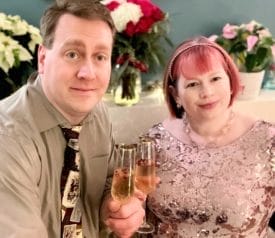 is reporting it is full, with kids with flu, RSV, and covid (often with two of the three), which is the first time since covid began we’re really hearing about a lot of hospitalized children. So if you have unvaccinated kiddies, take extra steps to be safe.
is reporting it is full, with kids with flu, RSV, and covid (often with two of the three), which is the first time since covid began we’re really hearing about a lot of hospitalized children. So if you have unvaccinated kiddies, take extra steps to be safe.
We have extra instant tests at the house, thanks to Microsoft, that has been giving them out to employees for the last two weeks, which is good, because both Glenn and I tested when we had low oxygen ourselves (turned out to be cold-related asthma, not covid, but better safe than sorry.)
So happy New Year’s to you, happy unrealistic resolutions (watch Pete Davidson and Miley Cyrus sing about this is a funny short video here, like “reading three whole books” and “learning Bosnian.”
Snowed-In Seattle
We had a surprise the day after Christmas – about four inches of snow, and record cold temperatures, and then a few days later, another three inches of snow. Needless to say this causes snags – like not getting trash pickup, or not getting to the store, and if you do get to the store, milk, water, and eggs are all gone. It’s a weird way to end the year. But my cat still loves the snow, as always!
We had record numbers of cancellations at SeaTac. Meanwhile Boulder just had a devastating wildfire on New Year’s Eve. It can’t just be a pandemic – it has to be all this other stuff, too? I had five friends diagnosed with cancer just this year. I can’t imagine going in for imaging and chemo – things I’ve had to do myself, though not during a pandemic, and know they are incredibly stressful. A reminder than minor things feel like major things, and major things just feel even more major, more life-shattering. I want to be closer to my friends and family than I feel like I can be – and being snowed in can feel like a very apt metaphor – we are all trapped at home and unable to travel, to see people, to do regular things like shopping. Or maybe that’s nonsense.
 Inspiration Board for 2022
Inspiration Board for 2022
I know it’s a little cheesy, and harder during a pandemic year, but I still went through the steps of doing my yearly inspiration board, and using my hands to cut and glue things makes me feel like a kid again, and there’s something innately…optimistic about putting up words and pictures that make you feel happy and hopeful. This year, words like “friends,” “inspiration,” “magic,” and “happiness” made appearances, along with images of foxes, pink typewriters, blooms and butterflies.
Anyway, I encourage you to try it yourself, even if it’s just a temporary one on a corkboard, or posting inspiring things on your fridge. What could we look forward to? What are the best possibilities? I’m far too good at looking at the dark side.
 Celebrations after the New Year
Celebrations after the New Year
We hope to see my brother and sister-in-law today for a Christmas/New Year’s/birthday get together, and later on this week, a good poet friend and her husband, and I’m hoping we didn’t pick the worst possible time for visits given the rising covid levels and weird weather. It’s hard not to feel like a prisoner after two years in virtual lockdown because of my immune system problems, even after vaccination, and I just want to be in human presence of someone besides my husband and cats (God bless them) and not just on a Zoom screen. It doesn’t really feel like we’ve had the holidays until we give presents and Glenn cooks for someone.



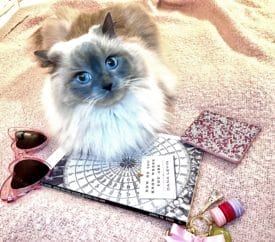


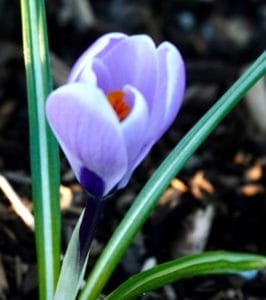










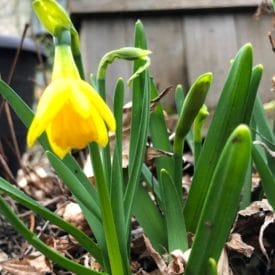
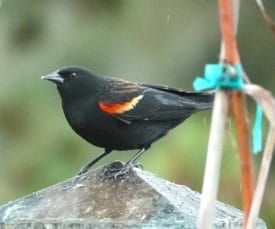


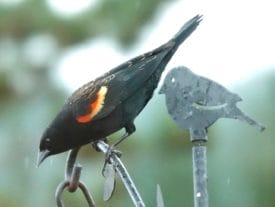
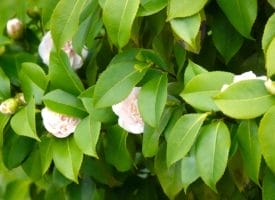

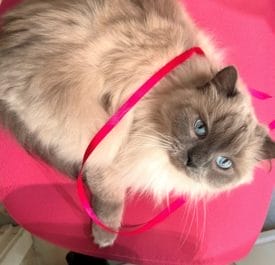




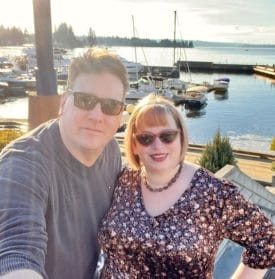






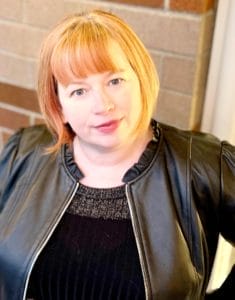

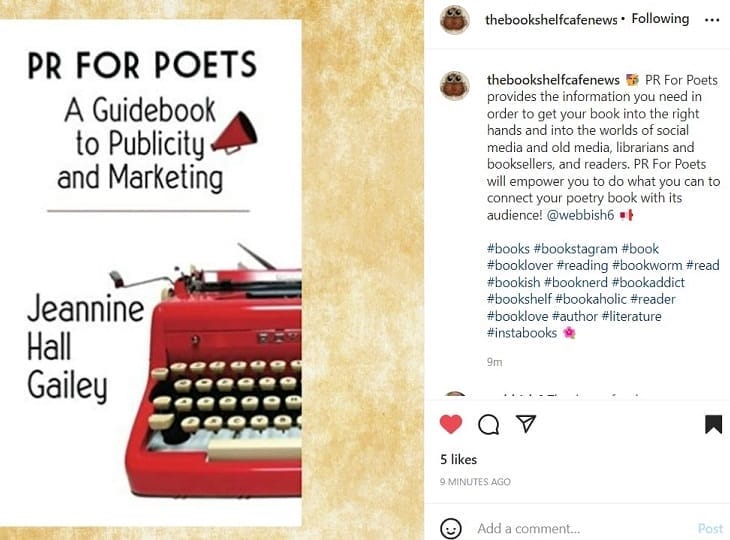
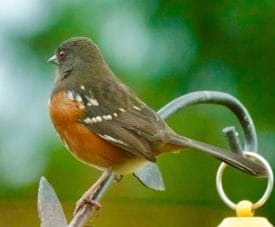







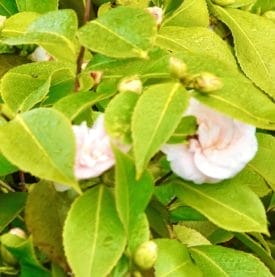




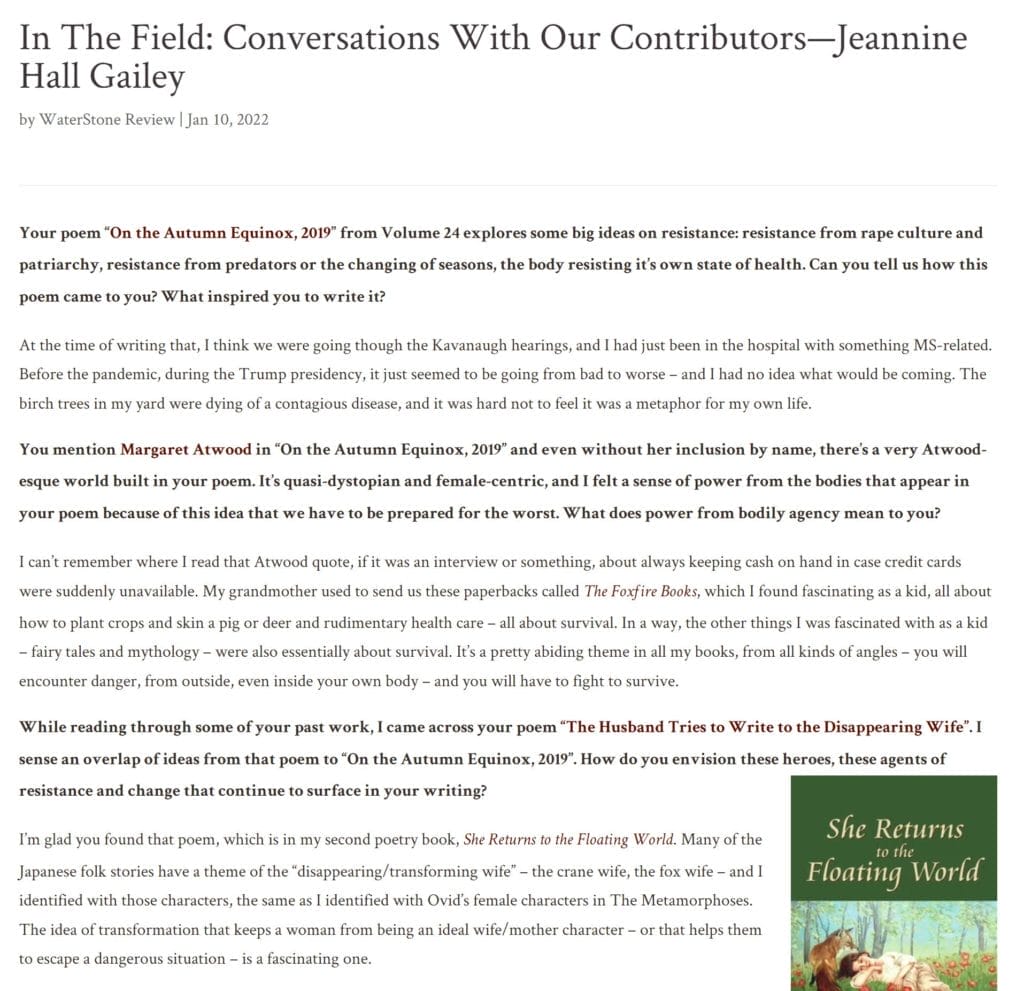


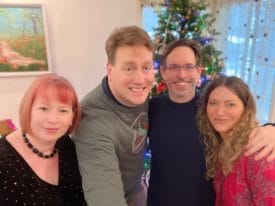


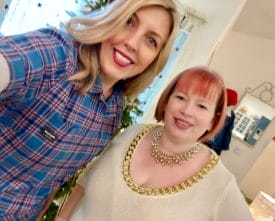





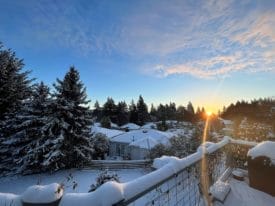
 Jeannine Hall Gailey served as the second Poet Laureate of Redmond, Washington and the author of Becoming the Villainess, She Returns to the Floating World, Unexplained Fevers, The Robot Scientist’s Daughter, and winner of the Moon City Press Book Prize and SFPA’s Elgin Award, Field Guide to the End of the World. Her latest, Flare, Corona from BOA Editions, was a finalist for the Washington State Book Award. She’s also the author of PR for Poets, a Guidebook to Publicity and Marketing. Her work has been featured on NPR’s The Writer’s Almanac, Verse Daily and The Year’s Best Fantasy and Horror. Her poems have appeared in The American Poetry Review, Poetry, and JAMA.
Jeannine Hall Gailey served as the second Poet Laureate of Redmond, Washington and the author of Becoming the Villainess, She Returns to the Floating World, Unexplained Fevers, The Robot Scientist’s Daughter, and winner of the Moon City Press Book Prize and SFPA’s Elgin Award, Field Guide to the End of the World. Her latest, Flare, Corona from BOA Editions, was a finalist for the Washington State Book Award. She’s also the author of PR for Poets, a Guidebook to Publicity and Marketing. Her work has been featured on NPR’s The Writer’s Almanac, Verse Daily and The Year’s Best Fantasy and Horror. Her poems have appeared in The American Poetry Review, Poetry, and JAMA.






